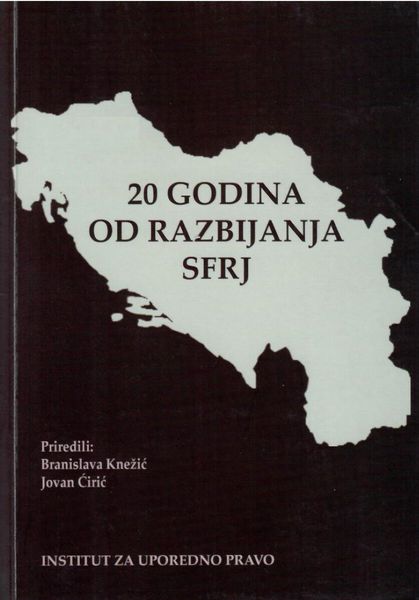Prvi udarac
The First Hit (Who Hit First?)
Author(s): Jovan Ćirić
Subject(s): Political history, Social history, WW II and following years (1940 - 1949), Transformation Period (1990 - 2010), Inter-Ethnic Relations, Politics of History/Memory
Published by: Institut za uporedno pravo
Keywords: the relation victim-offender; the history; memories; fear; first hit; formr Yugoslavia
Summary/Abstract: If you want to be a justfull judge, you must take in consideration all the circumstances of one case. You have to try to answer on the question who hit first? You must take in consideration the whole history of the relation between the person who commited the crime and the victim. Very of ten, it is not so easy to answer who the real victim is? Is it a wife who was molested for many years, and at the end she decided to resolve that situation and killed her husband? Or it is a husband who was killed? One criminal case, especially when it was happened inside a familly, sometimes could be very complicated. In the civil war, like the war in former Yugoslavia was, the story is very similar, at least, it was also like a crime in one family. To understand, the whole story about Yugoslav wars, to judge on a justfull way, it is necessary to take in consideration one very complicated history of the relations, first of all between Serbs and Croats. Understanding the 1991 is impossible without understanding 1941, when Croatian nationalsts, faschists, Ustashas made a terrible genocide against Serbs. In that sense the author of this article first cited what foreigners, officials said about that genocide against Serbs. Even Germans and Italians were schoked by what they have seen in the concentration camp of Jasenovac and in many vilages in Croatia and Bosnia, where Serbs were brutally killed by Croatians, by Ustasha. Serbs remembered very well what has happened during II World War and they were afraid that their neighbors, Croats would repeat all of that. The autor of this article thinks that many things during nineties happened because of that fear It was impossible for Serbs to forget the great crime, (magnum crimen). They were ready to forgive, but not to forget, and that was the most important origin of many things that has happened in the war in former of Yugoslavia. The author thinks that Serbs would accept the seccesion of Croatia in some other circumstances, but they had terrible experience, they knew what has happened before. Almost all Serbs that lived in Croatia had some cousin who was killed by Ustasha (Croats). Such a memory was an unbereable load for Serbs. So, the author of this article thinks that someone who wants to judge about the war and disintegration of former Yugolsvia, must have in mind that history, those memories and those experiences and fears. In that sense, like in evereday life, it is important question who hit first?
Book: 20 godina od razbijanja SFRJ
- Page Range: 183-212
- Page Count: 30
- Publication Year: 2011
- Language: Serbian
- Content File-PDF

